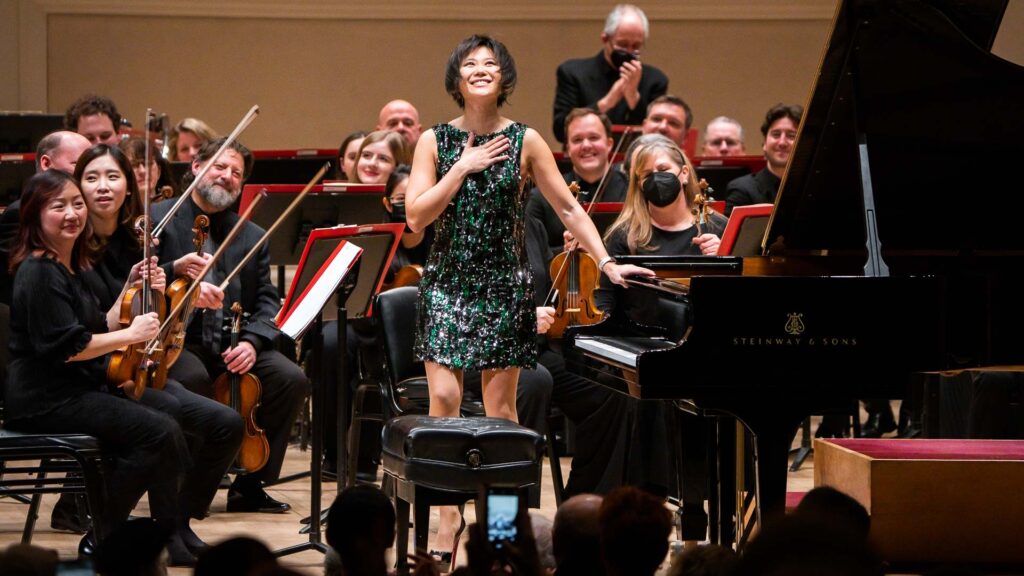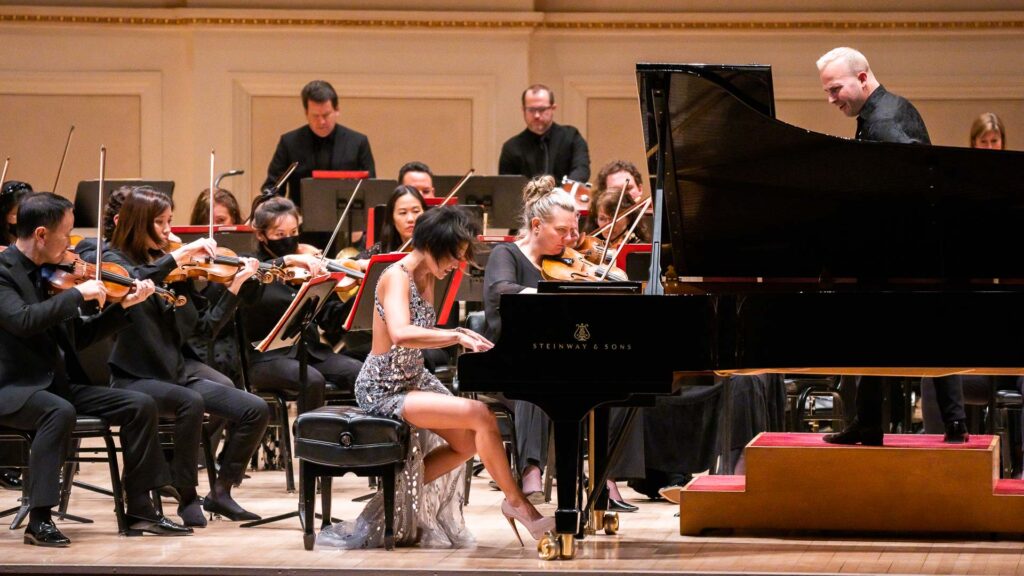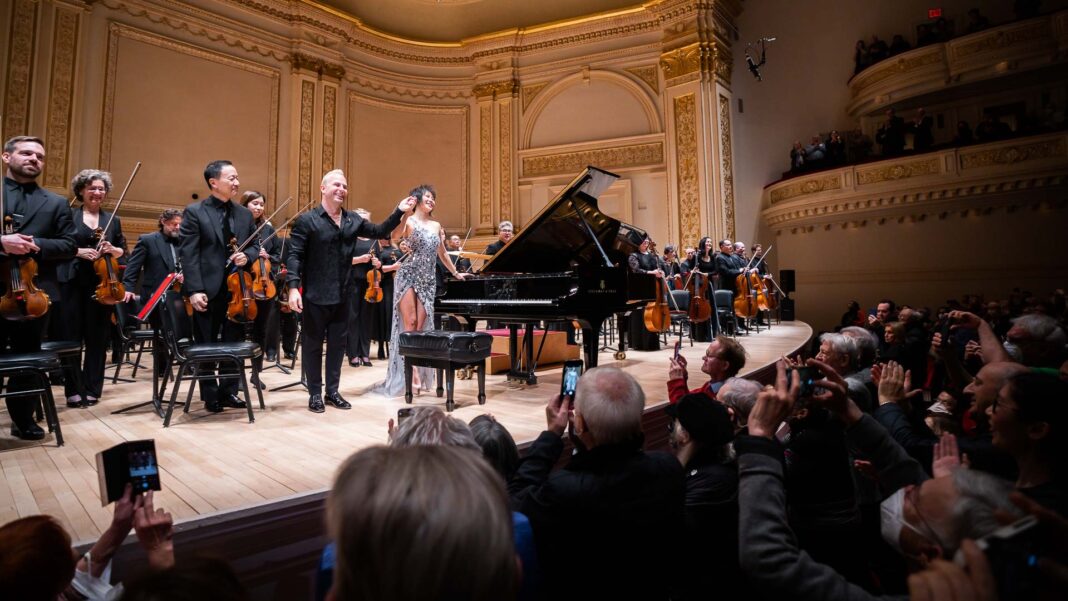It seemed impossible from the moment it was announced. One pianist was going to perform all four of Sergei Rachmaninoff’s piano concerti plus his Rhapsody on a Theme of Paganini in one concert. Usually a soloist would play just one of those and it would be considered all in a day’s work. What seemed at least improbable became entirely believable on Saturday as Yuja Wang and The Philadelphia Orchestra with conductor/Music Director Yannick Nézet-Séguin did just that during a marathon 4-1/2 hour long concert at Carnegie Hall.
2023 marks the 150th anniversary of the birth of Rachmaninoff. Certainly orchestras around the world will be celebrating his sesquicentennial in a variety of ways. Wang set the bar very high indeed for those who follow.
The program opened with Piano Concerto No. 2 in C Minor. This is perhaps the composer’s best known of his four concerti. The second movement served as the melodic line for the 1975 hit All By Myself from Eric Carmen. The third movement gave us the popular song Full Moon and Empty Arms which Frank Sinatra recorded in 1945.

Wang knows this concerto well. She recorded it with the Mahler Chamber Orchestra for her 2011 album Rachmaninov (there are two common spellings for his name.) The same album featured the penultimate piece she performed, Rhapsody on a Theme of Paganini.
The moment this concert began you could feel the anticipation in the audience and the excitement of what we all hoped this marathon would bring. Then there was the unexpected drama.
Just as Wang had embarked on the third movement, with the briefest of pauses after concluding the second, a gentleman in the audience had a heart attack. At least I believe it was a heart attack due to the medical updates Nézet-Séguin sprinkled through the performance. The concert came to a stop for roughly twenty minutes. I wondered how that might impact Wang and her plans for pacing herself.
This interruption reminded me of a 1980 movie called The Competition with Richard Dreyfuss and Amy Irving. Near the end of the movie as Irving’s character is performing in, what else, a competition, a key on the piano turns out to be wildly out-of-tune. Upset by the circumstances she demands to change the concerto she was performing and get a different piano.
Yuja Wang appeared to have no issue at all. They resumed by re-starting the third movement. At that concerto’s conclusion the audience immediately leapt to their feet – something they would do repeatedly. But this ovation seemed distinctly different than those that followed. It was as if they were celebrating the tenacity of the musicians on stage and almost willing the gentleman to recover.
Piano Concerto No. 1 in F-sharp Minor was next after a scheduled 10-minute break. When Wang returned we learned that one main reason for the scheduled breaks in the performance was so she could change from one shimmering outfit to another. A longer intermission was scheduled after two pieces had been performed.
And the marathon continued…
Along with the Piano Concerto No. 1, Rachmaninoff’s Piano Concerto No. 4 in G Minor, Op. 40 is another lesser-performed work. It’s also a concerto the composer revised twice – in 1928 and 1941. The 4th is how the second third of the concert began.
I should note that at no point did it seem like Yuja Wang was breaking even the slightest sweat. It’s as if the pressure of the marathon she chose to do was non-existent.

Leaving the monumental Piano Concerto No. 3 in D Minor as her final announced work, the Rhapsody was next. This is the sweepingly romantic music that found its way into the hearts of filmgoers who saw the 1980 film Somewhere in Time.
At the conclusion of the Rhapsody someone ran down the side of Carnegie Hall with a bouquet of white roses for Wang. Without hesitation she handed the roses to Concertmaster David Kim to show her appreciation for all that he and The Philadelphia Orchestra were doing.
The way this orchestra and Wang performed these works made each and every moment exciting. As we grew closer to the monster Rach 3 there was a palpable feeling building in the audience that we knew she would make it to the finish line in breathtaking form. We also knew we were experiencing a truly once-in-a-lifetime event. Since nothing like this has ever been done before, it is a first-time ever event.
What became clear as the afternoon turned into the evening was that you could definitely hear similar passages in each of the works. There was also an unmistakeable style to the way Rachmaninoff structured each composition.
It was time for the final intermission and the conversations around Carnegie Hall were often about what Yuja Wang might wear for her finale.
We took our seats for the last time for the mammoth undertaking that is the 3rd piano concert. You might recall Piano Concerto No. 3 as being at the center of the 1996 film Shine which landed Geoffrey Rush an Academy Award. It is intensely complicated and challenges even the finest pianists. It certainly must have challenged her, particularly after having performed four major works earlier in the concert. But if it did, she never made that noticeable to us.
What she did make clear was a sense of absolute elation when the marathon was over. Her embrace of Nézet-Séguin was long and felt like all remaining energy she had was finally free to leave her body. Each audience member found their own reserves of energy to give everyone on that stage a sustained ovation that dwarfed all that had come before.
But wait, there’s more. Yuja Wang being Yuja Wang, she performed a beautiful encore. But it wasn’t Rachmaninoff. It was Gluck’s Dance of the Blessed Spirits from his opera Orfeo ed Euridice.
I don’t know what Yuja Wang did after leaving the stage for the last time. But I know what I and many others did. Our blessed spirits were dancing our way out onto the streets of Manhattan.
All photos: Yuja Wang, Yannick Nézet-Séguin and The Philadelphia Orchestra at Carnegie Hall on January 28th, 2023 (Photos by Chris Lee/Courtesy Carnegie Hall)










